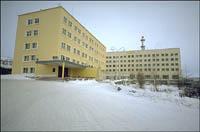NUCLEAR BARGES
Created | Updated Feb 15, 2003

The first story in the Crossing the Boundary series is Nuclear Barges. You could say research started back in 1994 (February 16th, 1994 to be exact) when I, Richard Creasey, an incorrigible enthusiast and multiple-media executive producer, visited Bilibino's nuclear power station.
Bilibino is in Siberia's far north, well above the Arctic Circle and give or take a thousand kilometres west of the Bering Straits. That is where Russia and America's little know back doors are, literally, just a step away from each other.
I was the expedition leader of Overland Challenge, a three month journey from London to New York via Siberia. Here is what I wrote about Bilibino in my expedition diary:
17 February 1994 - contd
We set off at four thirty that afternoon and completed the 280 kilometres that night! Bilibino at two short hours after midnight. The hour had changed for the last time in Russia and we were now exactly 12 hours in front of Greenwich Meantime. Precisely opposite. I couldn't be further from home.
Bilibino looked different even at night, the light bulbs were definitely brighter. It was where a nuclear power was situated.
16 February 1994
Bilibino (Chukotka, Siberia, Russia)
We woke up to find that Bilibino had no smoke stacks, in sharp contrast to Cherskiy and Zyryanka.
It really was a day off; we'd arrived there faster than Victor thought possible and the work on the Fords and the Urals had been finished the day before.
When the mayor came to the impressive dining hall in the same square as the hotel, he talked about the day's schedule: visit to Bilibino power station, sauna and swim, press launch then dinner.
Nuclear Power
The nuclear power station visit was, in fact, just as I'd imagined. Clean in a Russian sense. Very low tech and seatbeltless.
Clad in slippers, white coat, scarf, cloth hat and workman's helmet, we went into the reactor and stood around listening and talking for over half an hour. And we went to the control room and the generator plant.

Jeff and Peter were in charge of filming and the news to me was hearing Alexander the deputy director say that Chernobyl came about because of a design fault, not human error. There was no doubting what he said, even though the world had been told otherwise.
What the world also didn't know was that Alexander, like all his colleagues, hadn't been paid for three months.
And, somehow, the power station had overwhelmed the town. It was incredibly muted. No one on the streets, no drunks, well-stocked shops and a heated hotel. As if the power station meant they had too much to lose, had enough to keep them out of trouble but not enough to be freed by a modicum of anarchy or fun.
For Jeff, it was an extraordinary day, proof of how much there was to do to rid the world of nuclear power.
Five Years On ...
Aside from the occasional memory I didn't give Chucotka's nuclear story much thought for 5 years, when I went to Juneau, in March 1999, to try and get Bering on the Millennium off the ground. (This was, in my view, one of my better ideas, but the details aren't for here)
I was at Juneau, Alaska's Capital at the State Government HQ, biding time before my meeting with Fran Ulmer, the Lt. Governor. Jeff Berliner, who worked in the International Trade department, and whose knowledge of the region was, and I am sure still is, wide and all consuming, was very kindly showing me round and filling me in on the extensive relationships between Alaska and Siberia. As I do, I launched into my arm waving story about Overland and found myself describing our visit to Belibino. ”Did you know they Russian's are developing a dozen or more nuclear barges to power small town all round the Chutotka coast?” Jeff interjected.
I didn't, but that remark kept flashing into my mind creating a mass of contradictory thoughts. On the one hand I thought it was a pretty good idea. The smoke stacks that I had seen filling Siberia with soot and toxic fumes had always jarred, and in retrospect the Belibino nuclear power station had seemed hugely over the top - a big nuclear power station for a small and isolated town. Nuclear barges could be a great idea - provided of course they didn't go wrong. But, NON as they say in Russia, I couldn't help wondering if the staff, who would be there to maintain these things, were going to be paid – how much maintenance would they need? I wondered.
I decided to do some ‘on the side research’ into the matter. After all Chuchotka, that frozen, far away arctic area of the world, is forever in my blood.
First stop was, of course, the internet – google.com
First urls
I am dyslexic. Reading long (or short) research notes never gets much into my brain. But these notes confirmed that Jeff Berliner had set me onto something that was real. And much more, they would give me a chance of returning to Chukotka to find out more.
